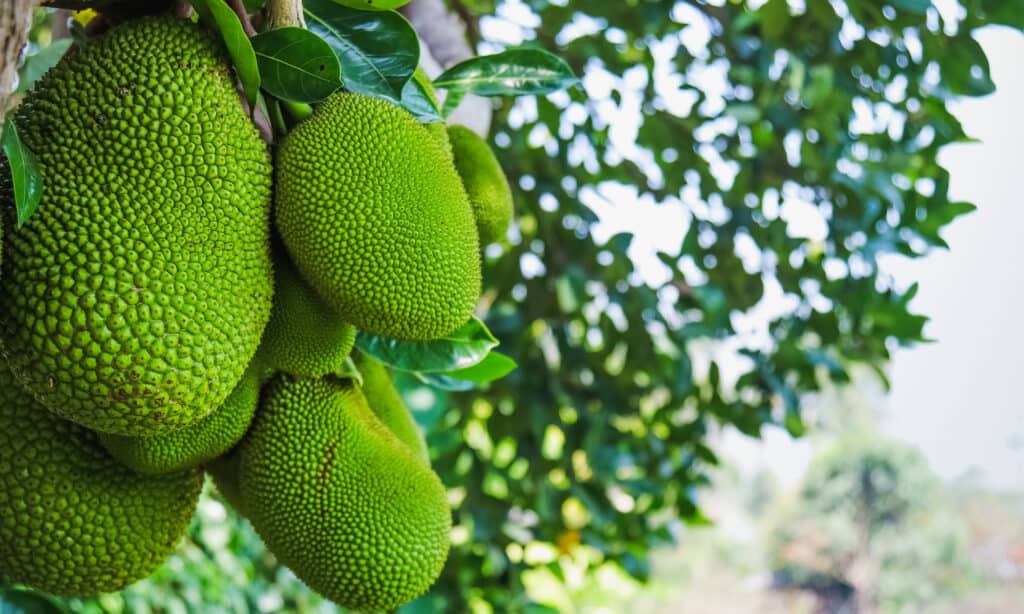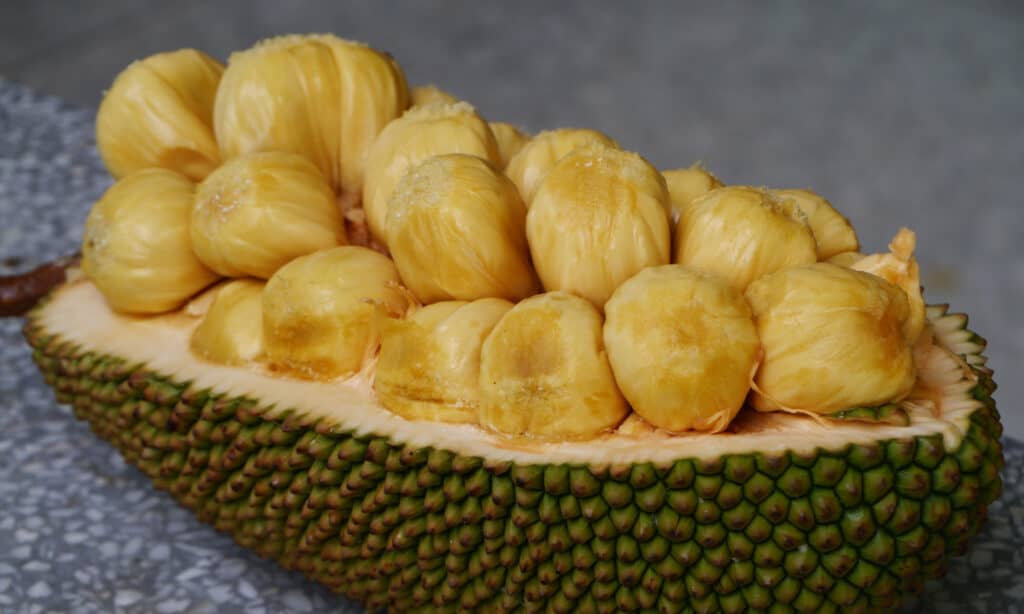In recent years, jackfruit has become widely popular as a versatile and healthy food option for many people. This unique fruit boasts a range of health benefits. Its meaty texture has made it a popular ingredient in vegetarian and vegan dishes. With such a trendy food making its way into our kitchens, it’s only natural for pet owners to wonder, “Can dogs eat jackfruit?”. It’s important to understand what our furry friends can and cannot eat to maintain their health. In this blog, we will delve into the world of jackfruit and canine nutrition. We will explore expert opinions on whether dogs can safely enjoy this exotic treat.

What is Jackfruit?
Jackfruit is a large, tropical fruit native to South Asia, mainly found in countries like India, Bangladesh, Sri Lanka, and Malaysia. It belongs to the Moraceae plant family and its scientific name is Artocarpus heterophyllus. Over time, jackfruit cultivation has spread to other tropical regions, such as Southeast Asia, Africa, and South America.
The fruit has a different appearance, with a thick, spiky green rind that encases the edible portions. Inside the jackfruit, you’ll find fleshy, yellow bulbs that cover large seeds. These bulbs, or “arils,” are the main part of the fruit that is eaten. The seeds can also be cooked and eaten.
Jackfruit has gained immense favor due to its numerous health benefits for humans, including being a good source of dietary fiber, vitamins (such as vitamin C and vitamin A), and minerals (like potassium and magnesium). The fruit is low in calories and fat, making it a healthy addition to many diets.
One of the unique traits of jackfruit is its meaty texture when cooked. This has led to its broad use as a plant-based meat sub in vegetarian and vegan cuisine. The fruit can be eaten raw, cooked, or even processed into various products, such as jams, chips, and ice cream.
Canine Dietary Needs
Dogs, like humans, require a stable diet to meet their nutritional needs, but the specific nutrients and balance may differ. Here are the key factors of a dog’s diet:
- Proteins: Proteins are the building blocks of your dog’s body and are important for maintaining healthy muscles, skin, coat, and immune system. High-quality protein sources for dogs include meats, poultry, fish, and eggs. Dogs can also obtain protein from certain plant-based sources, but these may not provide all the vital amino acids they need.
- Fats: Fats are vital for providing energy, supporting cell function, and promoting healthy skin and coat. They also help with the absorption of fat-soluble vitamins (A, D, E, and K). Dogs require both saturated and unsaturated fats, including essential fatty acids like omega-3 and omega-6. Common sources of healthy fats for dogs include fish, chicken fat, and flax seed.
- Carbohydrates: While not a strict must for dogs, carbs can be a valuable energy source and provide vital nutrients, such as fiber, vitamins, and minerals. Good carb sources for dogs include whole grains, fruits, and veggies. However, eating too much can lead to obesity and related health issues.
- Vitamins and Minerals: Dogs need a variety of vitamins and minerals to support various bodily functions. Some examples are bone growth, immune system function, and regulating metabolism. These nutrients can be obtained through a diet that includes a variety of foods, including meats, grains, fruits, and vegetables.
- Water: Proper hydration is essential for maintaining your dog’s health. Water plays a crucial role in regulating body temperature, digestion, and waste elimination. Always ensure your dog has access to clean, fresh water.
It’s important to remember that dogs have different digestive systems than humans. This makes them more sensitive to certain foods that may be harmless to us.

Expert Opinions on Dogs and Jackfruit
Expert opinions on dogs and jackfruit vary. Some vets and pet nutritionists considering it safe for dogs to consume in moderation. Others advise caution due to potential risks and side effects. Here’s a summary of expert perspectives on the topic:
Possible Benefits of Jackfruit for Dogs:
- Nutritional value: Jackfruit contains dietary fiber, vitamins, and minerals that can be great for dogs when consumed in moderation. The fiber content can aid digestion and promote gut health.
- Low in calories and fat: Jackfruit is low in calories and fat, making it a healthy treat option for dogs. Especially when compared to processed dog treats that may be high in calories and unhealthy additives.
Potential risks and side effects:
- Allergic reactions: Some dogs may be allergic or sensitive to jackfruit. This leads to symptoms like itching, skin irritation, or GI issues. It’s important to monitor your dog for any signs of an adverse reaction when introducing jackfruit into their diet.
- Gastrointestinal problems: Jackfruit is high in fiber. Excessive consumption may lead to diarrhea or an upset stomach in some dogs. It’s crucial to introduce jackfruit in small amounts to avoid digestive issues.
- Choking hazard: Jackfruit seeds and large chunks can pose a choking risk for dogs, especially smaller breeds. Always remove the seeds and cut the fruit into appropriate-sized pieces before offering it to your dog.
It’s important to note that expert opinions on dogs and jackfruit may differ based on individual experiences and circumstances. While some dogs may tolerate and enjoy jackfruit as an occasional treat, others might experience adverse effects.
How to Safely Introduce Jackfruit to Your Dog’s Diet
You can safely introduce jackfruit to your dog’s diet by following these steps:
- Start with small portions: As with any new food, it’s essential to begin with a small amount to gauge your dog’s reaction. Offer a tiny piece of jackfruit to your dog and observe them for any signs of upset or adverse reactions, such as vomiting, diarrhea, or itching.
- Gradually increase the amount: If your dog tolerates the initial small portion without any issues, you can slowly increase the amount of jackfruit you give them. Jackfruit is an occasional treat and should not be a staple in their diet.
- Prepare jackfruit properly: To ensure your dog’s safety, always remove the seeds and any tough parts of the jackfruit before offering it to your pet. Cut the fruit into small pieces appropriate for your dog’s size to minimize the risk of choking.
- Monitor your dog’s reaction: Keep a close eye on your dog after feeding them jackfruit, and look for any signs of an upset stomach or allergic reaction. If you notice any unusual behavior or symptoms, discontinue feeding jackfruit to your dog and consult your vet.
- Consult your veterinarian: Before introducing any new food, it’s always a good idea to consult with your vet. They can provide specific guidance based on your dog’s specific needs and dietary requirements.
Remember, every dog is different, and their experience with jackfruit may vary.

Alternatives to Jackfruit for Dogs
There are many fruits and veggies that can serve as healthy alternatives to jackfruit for dogs. These options can provide additional nutrients and variety to your dog’s diet without posing the same potential risks:
- Apples: Apples are a good source of vitamins A and C, fiber, and antioxidants. Make sure to remove the core and seeds before offering apple slices to your dog, as they can be harmful.
- Blueberries: Rich in antioxidants, fiber, and vitamins, blueberries make a nutritious and low-calorie treat for dogs. Offer blueberries (fresh or frozen) in moderation.
- Carrots: Carrots are low in calories and high in fiber, vitamins, and minerals, making them an excellent treat for dogs. They can also help maintain dental health when offered raw.
- Green beans: These vegetables are low in calories and packed with vitamins and minerals, making them a healthy addition to your dog’s diet. Offer cooked, unsalted green beans to your dog as a treat or mix them into their regular food.
- Pumpkin: Pumpkin is rich in fiber, vitamins, and minerals, and can be especially beneficial for dogs with digestive issues. Offer cooked, pureed, or canned pumpkin to your dog, but make sure it’s free of added sugars and spices.
- Sweet potatoes: High in fiber, vitamins, and minerals, sweet potatoes can be a nutritious treat for dogs. Offer cooked, unseasoned sweet potato pieces or puree to your pet.
- Bananas: Bananas are a good source of potassium, vitamins, and biotin, but they are also high in sugar. Offer small pieces of banana as an occasional treat.
When incorporating these alternatives into your dog’s diet, moderation is key. Always consult your vet for personalized guidance on your dog’s nutritional needs, and closely monitor their reactions to any new foods.

Conclusion
The question of whether dogs can eat jackfruit has varying expert opinions. While some dogs may be able to safely consume jackfruit in moderation, others may experience adverse effects or allergic reactions. It’s important to consult with your vet before introducing new foods to your dog’s diet and to closely monitor their response to ensure their well-being.
There are numerous dog-safe fruits and vegetables that can serve as healthy alternatives to jackfruit, providing additional nutrients and variety to your dog’s diet. It’s crucial to remember that moderation is key when offering these foods, and a balanced diet is vital for maintaining your dog’s overall health.
As responsible pet owners, we must account for our furry friends’ safety and nutrition. Always seek expert guidance and take necessary precautions when introducing new foods. By doing so, we can ensure our dogs live happy, healthy lives by our side.
~ Sheena
